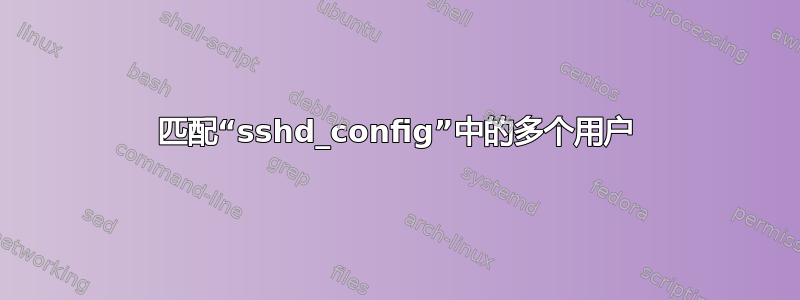
我正在尝试将相同的sshd设置应用于多个用户。
根据手册,它的Match User作用似乎是AND:
引入条件块。如果满足该行中的所有条件
Match,则以下行中的关键字将覆盖配置文件全局部分中设置的关键字
我如何声明“对于这些用户中的任何一个...”,因此在本例中bob,joe、 和phil被允许使用 SSH 作为代理,但不允许登录:
Match User bob, User joe, User phil
PasswordAuthentication yes
AllowTCPForwarding yes
ForceCommand /bin/echo 'We talked about this guys. No SSH for you!'
答案1
我自己没有这样做,我只能按照手册上的内容进行操作:
从sshd_config手册中:
匹配模式可以由单个条目或逗号分隔的列表组成,并且可以使用 的模式部分中描述的通配符和否定运算符
ssh_config(5)。
这意味着你应该能够说
Match User bob,joe,phil
PasswordAuthentication yes
AllowTCPForwarding yes
ForceCommand /bin/echo 'We talked about this guys. No SSH for you!'
请注意,“逗号分隔”意味着名称之间不应插入额外的空格。
另请参阅信息安全论坛上的此答案:在 SSH 中创建用户特定的身份验证方法。
答案2
对组而不是用户使用 Match 指令。然后将用户添加到该组中
Match Group users_with_no_ssh
PasswordAuthentication yes
AllowTCPForwarding yes
ForceCommand /bin/echo 'We talked about this guys. No SSH for you!'
答案3
我不确定 ForceCommand 能否与 SFTP 很好地配合使用。另外,也许最好在日志中看到“DenyUsers”一词。无论如何,我使用这个(好吧,也许使用 Group 会更好):
sshd_配置
# support, ansible & backup only from specific IP
Match User ansible,backup,support Address *,!176.x.x.x
DenyUsers ansible,backup,support
Match User backup
AllowTcpForwarding yes
AllowAgentForwarding yes
PermitListen 127.0.0.1:2223
AcceptEnv RESTIC_REPOSITORY RESTIC_PASSWORD
测试配置
# sshd -T -C addr=176.x.x.x,user=backup | egrep '^((deny|allow)users|permitlisten|acceptenv)'
denyusers root
acceptenv RESTIC_REPOSITORY
acceptenv RESTIC_PASSWORD
permitlisten 127.0.0.1:2223
# sshd -T -C addr=8.8.4.4,user=backup | egrep '^((deny|allow)users|permitlisten|acceptenv)'
denyusers ansible,backup,support
acceptenv RESTIC_REPOSITORY
acceptenv RESTIC_PASSWORD
permitlisten 127.0.0.1:2223
真实世界测试
Jan 29 16:50:12 mx1 sshd[71309]: Connection from 199.x.x.x port 21042 on 199.x.x.x port 2222 rdomain "0"
Jan 29 16:50:13 mx1 sshd[71309]: User support from 199.x.x.x not allowed because listed in DenyUsers
Jan 29 16:50:13 mx1 sshd[71309]: Connection closed by invalid user support 199.x.x.x port 21042 [preauth]


